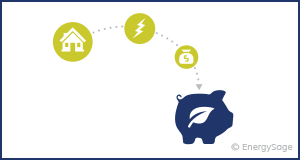There are two fundamental motivations behind why knowing how much power (estimated in watts) your TV utilizes is significant: so you can assess the amount it costs you, thus you can decide how much power you want from a solar battery during a power blackout to keep it running.
Assuming you Energy Rates plan on utilizing a solar battery during power blackouts, you want to characterize your fundamental burdens, or at the end of the day, the apparatuses you need to be powered by the put-away energy.
How much power does a TV utilize?
How much power a TV utilizes, or its wattage (W) relies upon maybe a couple of factors, like the size, what the TV is being utilized for, and the way that TVs truly do use energy when they are switched off nevertheless connected.
The typical measure of power a TV utilizes is around 100 W, yet you can find the specific data in its particulars sheet (they’re generally on the web), in the proprietor’s manual, or by checking out a sticker on the actual TV.
If you are utilizing a TV with put away power from a battery during a power blackout, you might not have any desire to marathon watch 10 hours of your new most loved Netflix series. Most capacity batteries hold 10 kWh of power, and watching 10 hours of TV would use around 1 kWh.
Do TVs utilize power when they’re off?
Indeed, similar to all hardware, TVs stay on backup mode.
Any piece of innovation that is connected will draw a negligible measure of power from the power source since it is consistently fit to be turned on. In any case, the energy that is utilized to keep gadgets running is negligible, utilizing under 0.5 W of reserve power.
So maybe if you are encountering a power blackout and have to depend on battery capacity, turn off your TV except if it is a fundamental burden. In any case, on a typical day, keeping your TV connected won’t cause an outrageous expansion in your electric bill.
What amount does it cost to run a television?
A TV doesn’t cost a huge load of cash to run. The typical power cost is around 13.01 pennies per kWh, and there are 1,000 watt-hours in a kilowatt-hour. So assuming you watched your TV for 10 hours per day, that would get you to that 13 pennies.
How do different TV models analyze their wattages?
The size, screen size, and sort of TV will direct how much energy it requirements to work. There are one or two sorts of TV models, including LED/LCD, plasma, and savvy TVs, all of which utilize differing measures of wattage to work.
Driven and LCD TVs utilize similar LED lights to run, which is the reason we are gathering them together. Plasma TVs utilize more LED lights than conventional LED TV. Shrewd TVs utilize a comparative add-up to LEDs, and they likewise can associate with the web.
The run-of-the-mill power utilization can go, contingent upon the size and sort of the TV. In any case, it is most likely correct that 100 W of power utilization is around what you can anticipate from a cutting-edge TV.

Solar, battery capacity, and your TV
Knowing your TV wattage is presumably just applicable assuming you want to decide how much power you want for running a TV on either put away energy or with little energy, as inside an RV.
Assuming you have the solar capacity for when the power goes out, simply know that the energy it has put away can’t keep all of your home devices powered on the double.

